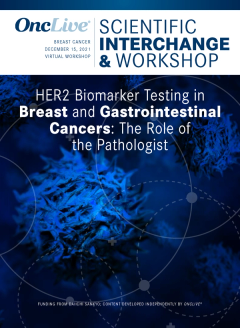
Dr. Graham on the Role of the Pathologist in Biomarker Testing in Breast and GI Cancers
Rondell P. Graham, MBBS, discusses the role of the pathologist in biomarker testing for patients with breast and gastrointestinal cancers.
Episodes in this series
Rondell P. Graham, MBBS, consultant, Division of Anatomic Pathology, Department of Laboratory Medicine and Pathology, associate professor of laboratory medicine and pathology, Mayo Clinic, discusses the role of the pathologist in biomarker testing for patients with breast and gastrointestinal (GI) cancers.
The first role of the pathologist in biomarker testing is diagnostic, both in specific tumor types as well as in general, Graham says. For example, a substantial proportion of patients with cholangiocarcinoma experience delays in diagnosis, so pathologists can play a role in combatting this challenge.
Pathologists also ensure tissue is efficiently used because patients are living longer as the result of more effective therapies, Graham explains. It is critical to select appropriate specimens for testing rare biomarkers. Additionally, general pathologists work with molecular pathologists in developing valid biomarker tests that have appropriate sensitivity and specificity for the targets of interest, Graham concludes.










































